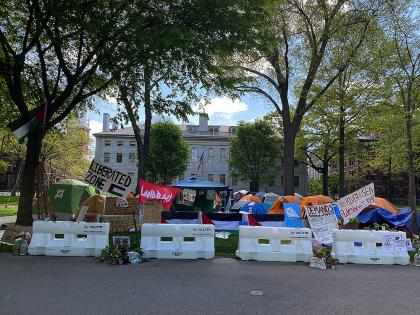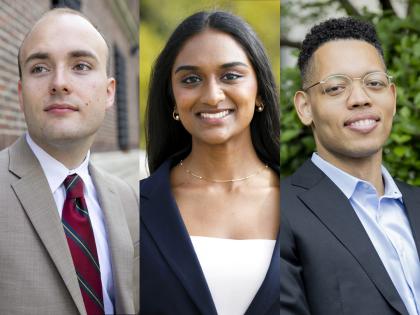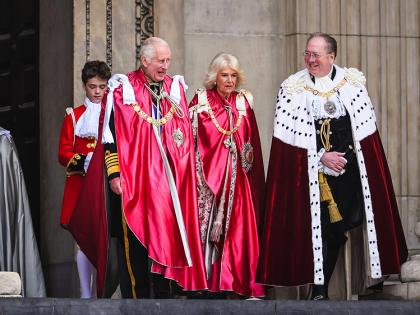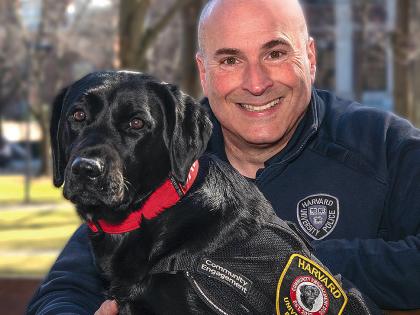The Radcliffe Institute for Advanced Study will welcome 52 fellows for the 2024-2025 academic year as part of its twenty-fifth anniversary class. The incoming fellows—who include scholars, journalists, writers, and playwrights—will pursue interdisciplinary work on subjects ranging from artificial intelligence to political philosophy to climate change.
The fellowship provides participants the opportunity to pursue creative projects while regularly convening with one another and the public. “In the current moment,” said former fellow and Radcliffe dean Tomiko Brown-Nagin, “I have never felt more certain that Radcliffe’s approach—its embrace of interdisciplinary research and discourse across difference—is crucial to generating transformative art, scholarship, and writing.”
The fellows include 13 Harvard faculty members:
- Myisha S. Eatmon (profiled in the January-February 2024 issue), assistant professor of African and African American studies and of history. She plans to complete a book on black Americans’ use of tort law to seek justice during the Jim Crow era, and to begin a second project on the legal relationship between black Americans and American Jews during Jim Crow and the Holocaust.
- Sandra Susan Smith (profiled in the May-June 2021 issue), Guggenheim professor of criminal justice. She will finish a book examining why spending more than one day in pretrial detention can dramatically impact life outcomes.
- Tracy K. Smith, professor of English and of African and African American studies and Wallach professor at the Harvard Radcliffe Institute, who served as the 22nd poet laureate of the United States. She will examine conscience and consciousness in the works of the poet Lucille Clifton.
- Daphna Renan, Munroe professor of law. She will collaborate with Nikolas Bowie on a book that contests judicial supremacy—the notion that the Supreme Court has the final say on interpreting the Constitution—and recovers a tradition rooted in abolitionism that allows the American people to define the Constitution democratically.
- Nikolas Bowie, Brandeis professor of law. He will collaborate with Daphna Renan on the above book.
- Shelly F. Greenfield, professor of psychiatry at Harvard Medical School. She will study rising rates of substance use among American women and girls.
- Tracey E. Hucks, Murray professor at the Radcliffe Institute and Thomas professor of Africana religious studies. She will study “lived religion,” or religion that is practical and experiential, focusing on vernacular, esoteric, and healing practices in black religion.
- Kelly Irwin, assistant professor of psychiatry. She will examine narratives of patients, families, and clinicians affected by mental illness and cancer, with the goal of decreasing the mortality gap experienced by individuals with mental health conditions, and addressing mental health discrimination in health care.
- Gabrielle Oliveira, associate professor of education and Brazil studies. She will work on a book that examines how migrant children conceptualize climate change, land loss, and mobility in Venezuelan and Brazilian schools.
- Brandon M. Terry, Loeb associate professor of the social sciences, who will work on two books about the political thought of Malcolm X and Martin Luther King Jr.
- Lauren K. Williams, Robinson professor of mathematics and Seaver professor at Radcliffe. She will write a book about cluster algebras and work on combinatorial problems from statistical physics, mirror symmetry, and scattering amplitudes.
- Melanie Matchett Wood, Radcliffe alumnae professor. She will examine how mathematicians can expand on the classical probability theory of numbers to study distributions on more highly structured objects.
- Laura Weinrib, Fishman professor of constitutional law and Murray professor at Radcliffe. She will write a book on labor unions, corporations, and money’s role in politics in the United States.
Other fellows include Daniel L. Chen ’99, J.D.’09, who will use artificial intelligence to identify inefficiencies and biases in judicial systems, and Tracy R. Slatyer, Ph.D. ’10, who will use the James Webb Space Telescope to study cosmic history and dark matter. This year’s cohort also includes two Radcliffe-Salata Climate Justice Fellows: Holly Buck, who will write a book about how rural communities engage with technology-oriented visions of the future, and Rachel Morello-Frosch, who will research the health and equity benefits of climate change policies.







